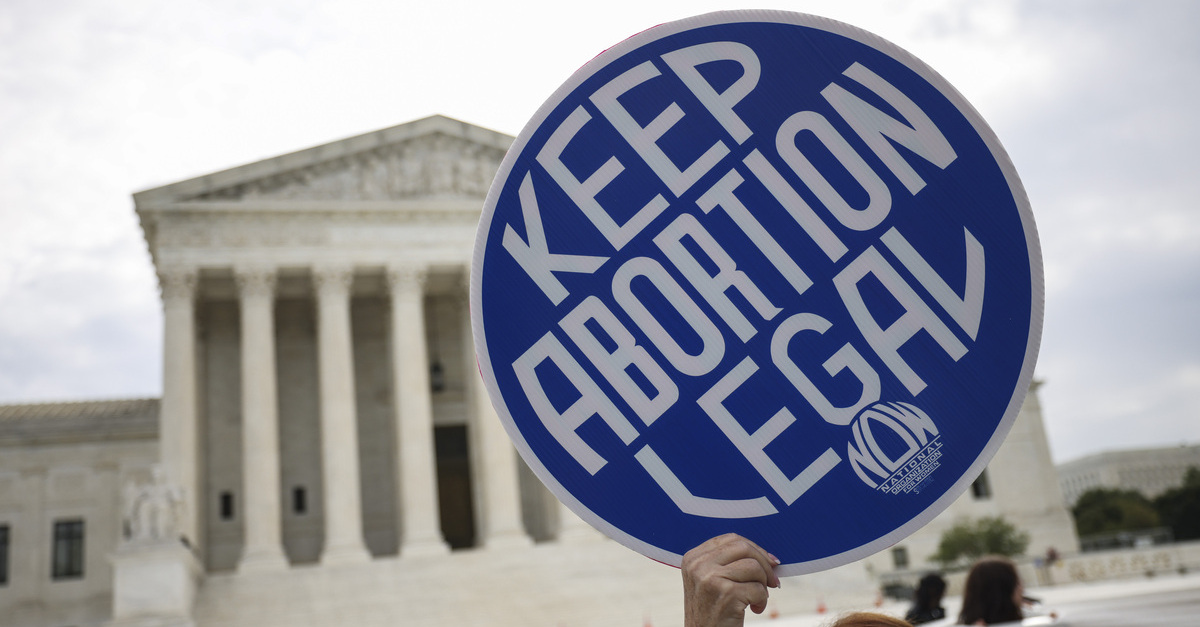
Pro-choice activists demonstrate outside the Supreme Court on October 4, 2021 in Washington, DC.
The Supreme Court of the United States handed down its official opinion in Dobbs v. Jackson Women’s Health Organization on Friday, closing the loop on the bombshell draft leaked to press in early May. As expected, the Court’s ruling overturned Roe v. Wade and Planned Parenthood v. Casey, thereby eliminating any federal guarantee of the right to have an abortion.
In the majority’s opinion, the justices declared that they “do not pretend to know how our political system or society will react to today’s decision,” clarifying that “even if we could foresee what will happen, we would have no authority to let that knowledge influence our decision.” Despite the justices’ statement, a great deal about political reactions to the Dobbs ruling has been clear for some time.
About half the states planned for this moment by adopting what are known as “trigger laws” — statutes that were written to go into immediate effect after Roe was overturned. Other states lack legislation that is effectively automatic, but they are still expected to legislate immediately to ban or seriously restrict abortion.
A third group of states has or is expected to adopt hefty state-level protection of the right to have an abortion by amending their constitutions or passing legislation. This patchwork of rights is precisely what the Supreme Court intended, as the 6-3 opinion authored by Justice Samuel Alito — and joined by Donald Trump appointees Justices Neil Gorsuch, Amy Coney Barrett, and Brett Kavanaugh — took no position on what abortion law should do. Rather, the Court returned the question of abortion entirely to the states with unfettered authority to legislate without any requirement to adhere to federal guarantees of reproductive freedom. Chief Justice John Roberts concurred in the judgment.
The unsigned dissenting opinion joined by Justices Stephen Breyer, Sonia Sotomayor, and Elena Kagan acknowledged what has — and what will happen — as a direct result of the Supreme Court’s decision in Dobbs. The dissenters wrote:
Under the majority’s ruling, though, another State’s law could do so after ten weeks, or five or three or one—or, again, from the moment of fertilization. States have already passed such laws, in anticipation of today’s ruling. More will follow. Some States have enacted laws extending to all forms of abortion procedure, including taking medication in one’s own home. They have passed laws without any exceptions for when the woman is the victim of rape or incest. Under those laws, a woman will have to bear her rapist’s child or a young girl her father’s—no matter if doing so will destroy her life. So too, after today’s ruling, some States may compel women to carry to term a fetus with severe physical anomalies—for
example, one afflicted with Tay-Sachs disease, sure to die within a few years of birth. States may even argue that a prohibition on abortion need make no provision for protecting a woman from risk of death or physical harm. Across a
vast array of circumstances, a State will be able to impose its moral choice on a woman and coerce her to give birth to a child.
Here is a look at what some of the states with “trigger laws” have already done:
Arizona: The statute criminalizes abortion and allows anyone who helps a woman obtain an abortion-inducing drug or performs or aids in a surgical abortion to be sentenced to two to five years in prison. The only exception is if an abortion is required to save the woman’s life.
Arkansas: The statute bans all abortions “except to save the life of a pregnant woman in a medical emergency.” It also criminalizes performing or attempting to perform an abortion and applies a penalty of up to a decade in prison or a fine of up to $100,000. It does not authorize the bringing of charges against the pregnant woman.
Idaho: The statute criminalizes all abortions as punishable by up to five years in prison, except in cases where the abortion is performed “to prevent a pregnant woman from dying, or in cases of rape or incest.” Idaho also mandates that any healthcare professional who performs or attempts to perform an abortion will have their license suspended for at least six months for the first offense and permanently for subsequent offenses.
Kentucky: The statute bans all abortions except those in which a physician “in reasonable medical judgment” finds the abortion “necessary . . . to prevent the death or substantial risk of death due to a physical condition, or to prevent the serious, permanent impairment of a life-sustaining organ of a pregnant woman.” Even in those cases, however, the statute demands that the physician “shall make reasonable medical efforts under the circumstances to preserve both the life of the mother and the life of the unborn human being in a manner consistent with reasonable medical practice.” Under Kentucky’s law, the performing of an abortion is a felony punishable by up to five years imprisonment.
Louisiana: This law, very similar to Kentucky’s, also bans all abortions except those “necessary in reasonable medical judgment to prevent the death or substantial risk of death due to a physical condition, or to prevent the serious, permanent impairment of a life-sustaining organ of a pregnant woman.” Louisiana also requires that doctors in those exceptional circumstances make reasonable medical efforts to “preserve both the life of the mother and the life of her unborn child in a manner consistent with reasonable medical practice.” The statute sets out penalties of fines of $1,o00 and up to two years’ imprisonment.
Mississippi: Mississippi’s law is set to go into effect 10 days after its state attorney general determines that the U.S. Supreme Court has overruled Roe v. Wade and has deemed it “reasonably probable” that the state law would be upheld by SCOTUS as constitutional. The law bans all abortions except those necessary to preserve a mother’s life and in cases when the pregnancy was the result of rape. In order for the rape exception to apply, however, “a formal charge of rape” must have been filed with “an appropriate law enforcement official.” Violators of the law will face up to 10 years imprisonment.
Missouri: Missouri’s statute criminalizes all abortions except those performed “because of a medical emergency,” and specifies that any medical professional who performs an abortion risks suspension or revocation of their license. The statute clarifies that a woman “upon whom an abortion is performed or induced” shall not be prosecuted for conspiracy. Missouri makes performing an abortion a Class B felony which carries a penalty of between five and 15 years in prison.
North Dakota: Criminalizes abortion except in cases necessary to save the pregnant woman’s life, and in cases where pregnancy “resulted from gross sexual imposition, sexual imposition, sexual abuse of a ward, or incest.” As a Class C felony, the offense carries a penalty of up to five years imprisonment and up to a $10,000 fine. North Dakota’s law would go into effect after its legislature “approves by motion the recommendation of the attorney general to the legislative council that it is reasonably probable that this Act would be upheld as constitution.”
Oklahoma: Makes all abortions illegal except those to save the life of the pregnant woman. Under the law, performing an abortion or attempting to perform one is a felony punishable by a maximum fine of $100,000 or a maximum of 10 years in state prison, or both. month that would make performing abortions illegal in the state, only allowing exceptions to save the life of the pregnant woman.
In May, Oklahoma Governor Kevin Stitt (R) signed a bill into law that allows private citizens to sue abortion providers or anyone who helps a woman obtain an abortion for up to $10,000. Stitt declared that his wish is for “Oklahoma to be the most pro-life state in the country.”
South Dakota: Criminalizes any abortions administered “to any pregnant female” unless “there is appropriate and reasonable medical judgment that performance of an abortion is necessary to preserve the life of the pregnant female.” Abortions in South Dakota are a Class 6 felony, which carry a maximum penalty of 2 years imprisonment and a $4,000 fine. South Dakota’s trigger law has been on the books since 2005, and it provides that the restriction goes into effect as soon as the Supreme Court recognizes state “authority to regulate abortion at all stages of pregnancy.”
Tennessee: The state’s 2019 “Human Life Protection Act” makes providing or attempting to provide an abortion a felony unless the abortion “was necessary to prevent the death of the pregnant woman or to prevent serious risk of substantial and irreversible impairment of a major bodily function of the pregnant woman.” Penalties include prison time of three to 15 years fines of up to $10,000, and loss of voting rights.
READ RELATED: The Stolen Money That Became A Windfall For Joel Osteen’s Plumber
Texas: Makes it a first-degree felony to perform or induce an abortion “if the unborn child dies as a result of the offense,” and a second-degree felony for anyone who “knowingly performs, induces, or attempts an abortion.” The only exception is if a pregnancy would kill or severely injure the pregnant woman. Making abortion a first-degree felony puts the crime on par with as attempted capital murder, aggravated kidnapping, aggravated robbery, and aggravated sexual assault, and subjects the offender to a sentence of 5 to 99 years in prison and a fine of at least $100,000 for each offense. A Texas statute that is the subject of current challenges also allows private citizens to enforce abortion restrictions.
Utah: Utah’s 2020 law declares that life begins at embryonic implantation, and will make it illegal to provide an abortion except in cases of rape, incest or a health emergency that threatens the life of the mother. The applicable sentence is one to 15 years, with a fine of up to $10,000.
Wyoming: Will outlaw all abortions, effective five days after the governor, on advice of the attorney general, certifies to the secretary of state that SCOTUS has overruled Roe v. Wade. Wyoming allows limited exceptions for cases of sexual assault, incest, or the risk of death or severe injury to the person giving birth.
What’s happening in some states that lack trigger laws, but that are nevertheless poised to restrict abortion in the immediate wake of the Dobbs decision.
Iowa: Abortion is currently legal in Iowa until 20 weeks of pregnancy. However, Republican lawmakers are also working to pass an amendment to the Iowa Constitution overturning a recent state court decision protecting the right to have an abortion. If that effort succeeds, Iowa’s GOP-controlled legislature and governor have promised to further restrict abortion access.
Florida: Gov. Ron DeSantis (R) signed a bill in April that bans most abortions after 15 weeks. The law will take effect July 1, and will replace the prior statute that allowed abortions until 24 weeks of pregnancy. No exceptions are allowed for rape or incest, but abortion is allowed to save the life of a pregnant person or prevent serious injury to them.
Alabama: Gov. Kay Ivey (R) signed into law the Alabama Human Life Protection Act in 2019, which would outlaw most abortions. A federal judge temporarily blocked the law shortly after Ivey’s signing.
Georgia: Under Georgia’s 2019 law, abortions are illegal after cardiac activity has been detected in an embryo (typically, at about 6 weeks of pregnancy). There is a pending lawsuit in the U.S. Court of Appeals for the 11th Circuit challenging the law that is currently on hold pending the SCOTUS decision.
Indiana: Abortion in Indiana is currently legal up to the 22nd week of pregnancy, though state legislators have tried several times to ban or seriously restrict abortion access. Indiana’s Republican supermajority in the legislature is expected to pass a highly-restrictive abortion law quickly following the SCOTUS ruling in Dobbs.
The Supreme Court’s ruling in Dobbs does not, of course, mean that states are required to restrict abortion. Rather, the ruling removes the floor for the right to abortion access, not the ceiling. At the same time that many states have adopted laws restricting or prohibiting abortion, other states have enshrined the right to have an abortion into state law or otherwise expanded abortion access.
Sixteen states and the District of Columbia have taken such measures: California, Colorado, Connecticut, Delaware, Hawaii, Illinois, Maine, Maryland, Massachusetts, Nevada, New Jersey, New York, Oregon, Rhode Island, Vermont and Washington.
In February 2022, the Vermont House gave final legislative approval for an abortion-related question to go on the ballot in the general election in November. If the measure passes, Vermont would become the first state to amend its state constitution to specifically protect the right to have an abortion.
The proposed amendment reads:
That an individual’s right to personal reproductive autonomy is central to the liberty and dignity to determine one’s own life course and shall not be denied or infringed unless justified by a compelling State interest achieved by the least restrictive means.
After the Dobbs opinion was leaked, Connecticut lawmakers approved a bill that would expand the field of people who can legally perform certain types of abortions. Under the law, nurse-midwives, physician assistants and other medical professionals are authorized to perform some abortions.
California is poised to enact a series of legislative measures designed to the right to protect abortion rights.
As the U.S. becomes a country with wildly-varied abortion laws from state to state, the next legal battles over abortion will likely become those about jurisdiction and travel. Generally, states only have authority to legislate within their own borders. However, there are some circumstances in which states may legislate about actions occurring outside their borders when the impact of those actions falls inside the legislating state.
Still, there is a long history of the Supreme Court ruling against any state action designed to stifle interstate travel. How the Supreme Court’s abortion jurisprudence will ultimately line up with its history of protecting mobility of citizens remains to be seen.
[Photo by Kevin Dietsch/Getty Images]
Have a tip we should know? [email protected]
Source:





